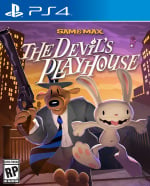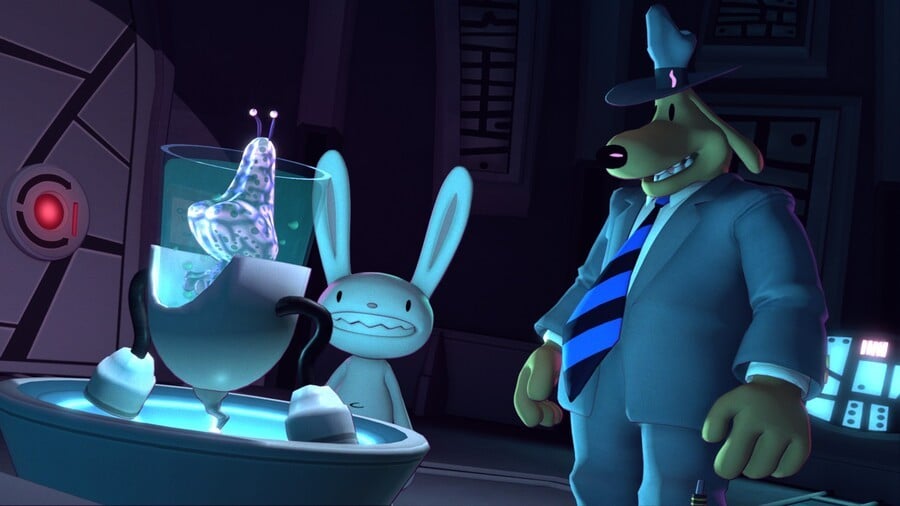
Back in November 2020, Skunkape — a company comprised of Telltales Games' co-founder Dan Connors and various former Telltale talent — announced it had acquired the rights to remaster the Sam & Max games for modern platforms, starting with a remastered version of Sam & Max: Save The World.
Released just one month later, in December of the same year, this remaster of Sam & Max: Save the World boasted better lighting, camera placement, and editing, as well as newly recorded music, an enhanced frame rate, and faster loading times, making it the definitive way to play the game for fans both new & old.
So, in the time since, you'd be relieved to hear that Skunkape has also gone on to remaster the remaining two games in the Sam & Max series in the same way — Sam & Max: Beyond Time & Space and Sam & Max: The Devil's Playhouse — bringing the same care and attention to detail to the other two Telltale titles, despite various technical challenges and the odd delay.
With Skunkape having now released all three of these games across modern platforms (Nintendo Switch, PS4, Xbox One, and PC), we wanted to check in with the team to hear the story of how they chose Sam & Max for the remaster treatment, the challenges they faced along the way, and what's next for the studio. This led us to interview the Skunkape founder Dan Connors and the former Telltale director of production technologies and current Skunkape partner Jonathan Sgro to pick their brains on all of the above. You can read our conversation with them below (slightly edited for clarity and length).
Time Extension: Just to start, it would be interesting to go back to the very beginning of these remasters. Why did you decide to go back to Sam & Max following everything that happened with Telltale and the properties all kind of being up in the air?
Connors: I think the choice was mostly around the fact that was probably our most preferred title to work on. I caught word that they were reselling a lot of the franchises when stuff happened with Telltale. And I knew that Jake [Rodkin, a former game designer/creative director at Telltale] would be into Sam & Max, almost for certain. And partnering with Jake to work on Sam and Max was completely compelling to me and then I also knew Jon and Randy [Tudor] would do it too.
So you know I talked to Jake about it and we did the legal stuff with the new organization that was selling franchises off and once that was done we had a really nice thing structured that gave us access to everything we needed to remaster the Sam & Max games. We couldn't get everything and I think at the end of the day, Sam & Max was probably the one we were best suited for, the one we were most excited for, and it was like the biggest chunk of work.
Time Extension: Could you give us a little more information about the Skunkape team? How many people are actually at the studio and how has that changed during development as you reached this ambitious third project?
Connors: Well we were we were super lucky to have Brett Rogstad working with us who knew the tool and was able to handle a lot of the lighting stuff as well. Jared came back to do the music stuff, and we're really proud of the soundtrack and the soundtracks. We had Eric Parsons doing a lot of the cinematography for us too. And we were able to find really good people near Jon and he could talk about Emma Cooper who had joined us. And then we outsourced some of the testing and some of the marketing. But it was a lot of friends. Everyone likes the opportunity to work on Sam and Max.
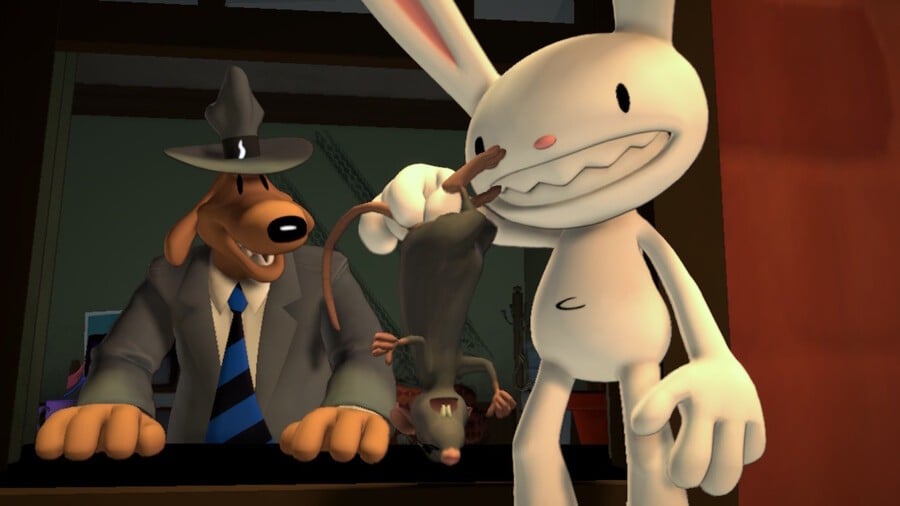
So, in total, it probably maxed out at about 12 people. And yeah, it was a lot of people who were returning to work that they had done in the past. They were coming in with the knowledge that you don't usually get in game development.
Sgro: So the team again was Randy and I as the only full-time people working on it every day. Then we had Brett Rogstad doing lighting. He did all the lighting for all three seasons. I met Emma at the University of Connecticut. And then we had a few people, as we mentioned, doing the cinematography, and Julian [Kwasneski] and Jared doing some audio and music work. We also had a few core programmers helping out with some engine bugs and some new technology.
Time Extension: In terms of getting everyone back on board, a big thing would obviously be approaching Steve Purcell, Sam & Max's original creator. What was his reaction to the idea of going back and revisiting these games and making them available again?
Connors: It goes back to your first question, "Why Sam and Max?" Part of that is we had a good relationship with Steve and Jake has kept a good relationship with Steve. I was a tester on Hit the Road and I also worked on [the cancelled project] Freelance Police at LucasArts. So Steve and I have kind of been through this a few times.
And, obviously, Steve was a big supporter of Telltale and an important part of making Telltale happen. So when we said we wanted to do this and we would bring attention to it and do the remaster and we would do it right, he was like, 'Yeah, let's go, let's do it, this is going to be great.' This is just one of those things that the circumstances are what kind of led to it happening. So I think it's been a very positive, positive thing for the franchise, because the remasters have done so well and have introduced more people to Sam & Max, and they still kind of generation after generation, gather new fans, which is pretty cool. There are always people out there who are interested in this really unique, fresh take on things, even 30 years later or whatever.
Sgro: it was a no-brainer for Steve because we already had a relationship with him. I had worked on Freelance Police and there was Jake and Randy, and it was very obvious that we were the right people to be doing this for him, so why not?
Time Extension: It would be interesting to hear — what actually happened to the Sam & Max assets when Telltale closed? Did everything related to the project just get packed away in a box somewhere ready for you guys to kind of come along years later and break everything out again?
Connors: A box is probably not the best term for it, but I suppose you're talking about a hard drive, then yeah, a box.
The rights have different ownership around them because Telltale always worked with franchises, so each of those franchises has a say in what happens with the products. And the people who own the assets have a say in what happens to the products and the engine is something that's also a strong asset for people.
So it's just everyone that has participated in it needs to come together and talk about you know what can still be done what can't be done for whatever reasons. And then the assets do exist. And there's a technical challenge in making it all work again and making it worthwhile and making a business case for it.
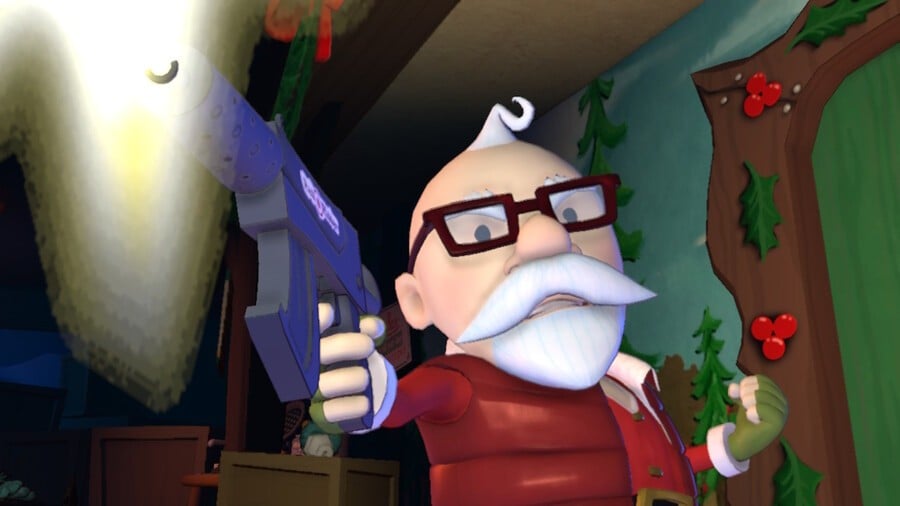
So, yeah, I mean, there was a ton of work done there. Kevin Bruner's diligence about always making sure that we kept the assets running on every new engine that was built, made it so that the assets from 2009 for Sam & Max Season 3 still ran in the last version of the tool that was done in 2018 for Walking Dead Season 4.
Sgro: Yeah, to some extent. There are issues that we had to deal with, but the methodology of Telltale made it so, it's not like we finished a game and then archived it into a box and threw it away somewhere. Like everything we worked on was always accessible. You'd see it in the games where we'd work on Monkey Island and there'd be animations that were from the first Sam and Max or the third Sam and Max had animations from Monkey Island or assets from Bone or CSI or whatever. Like all the games assets were always available so it was one big big box. So then when we started for Skunkape we just had to grab that Sam & Max subset and bring it over.
Time Extension: When you went back for the assets and looked through everything, was there anything in particular that was missing in terms of the art, audio, or anything like that?
Sgro: Probably 99% of the assets were there. The few missing things were Jake's doing (laughs). Jake forgot back in 2005 or 2009 to check something in originally so we're missing the final version of something. Or sometimes the PSD would be missing, so we don't have the layered art for some textures or some background so we only had the compressed version. So yeah, we had most of the stuff, I guess. Dan, what was the deal with foreign language audio? We didn't have the masters for the translated audio, right?
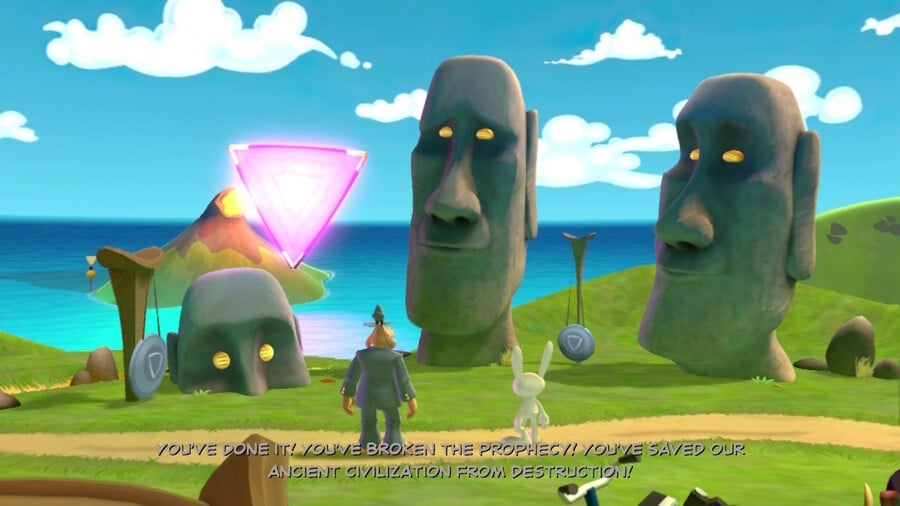
Connors: Yeah, there was some stuff that was done in partnership with JoWooD, I think, at the time. And so they had done the recording on their side, so they had those assets. But I think we processed some of the languages for some of the first two games. Actually, some of the languages were only recorded because we had the partnership with JoWooD to go into Europe. So did we end up getting those assets back and putting them in? I can't remember now. It's been a while. I think Bay Area Sound ended up helping us figure out a way to get all that stuff.
Sgro: We didn't do any localized voice for any of the remasters.
Connors: For any of the remasters, right? And I guess that was because they were done in a different --
Sgro: We didn't have the master files, and everything we had was too compressed and just sounded like shit. So we got punted on it.
Connors: Yeah. So that was one area where we didn't have the source because it wasn't part of the Telltale package of assets.
Time Extension: At the start of the process, when you were looking at Sam & Max Save The World, how did you identify the areas that you felt you could improve? Were you thinking ahead in terms of 'We might eventually get around to Devil's Playhouse', which is obviously more ambitious when setting the scope?
Connors: So there were improvements that happened just in moving to the latest version of the engine. There was technology that was done in 2018 that wasn't there in 2009 or earlier. So there was a lot of stuff there that was just kind of happened. And then the fact that the platforms have all come a long way since that as well. We're another generation forward on platforms.
So, you know, everything was kind of up-ressed a little bit. And Jon can talk more about the specific stuff that we did. But, you know, there's also the element of we built the games in the first place, so we knew every nook and cranny in terms of what was there and what we wanted it to be and what we could improve and what was easy for us. So I think our unique position made it so that it was pretty clear what needed, what could change, and what we should change.
Sgro: Yeah, as Dan was saying, getting the new engine gave us better performance. We could throw more polys and we had more memory usage. And we could use the dynamic lighting system. That was still a lot of work and we had to relight the entire game.
So [we could take advantage of] all the new features that had been put into the engine all those years. Like the lip sync system had been iterated on many, many times. So that technology was much better than when we originally released the games. But back to the original question about thinking about the three games. When we started the first one, we knew that the third one was going to always be a problem in terms of the art direction because the game had that gritty kind of somewhat realistic texture look to it. And we knew that it was going to have to be something we had to figure out. But we didn't worry about it too much when we started the first one. We were like, 'Okay, we'll get to that eventually if everything works out.' We could have made zero money and not done anything.
But one of the things we did think about, though, was the control schemes and the UI. We tried to start making the UI and controls and the menus cohesive against all the products. Because one and two are mostly the same, but the third one is a bit different. It was like bringing back the joystick control into the first one when it was originally point and click, and the opposite in the third one, trying to make everything so when you play them all together they all felt cohesive.
Time Extension: What have been some of the biggest technical challenges with approaching The Devil's Playhouse compared to the other games?
Connors: Jon you want to take that one on?
Sgro: Yeah I'm just trying to think about to say it without throwing people under the bus (laughs). It was just more complicated across the board. The programming, the art, the tricks that were done in the engine to achieve certain things. Like the way the narrator was presented on the screen loaded on top of other scenes. There were some core technical issues that we had to deal with.

I guess, specifically talking about the whole narrator thing. There's a bunch of times where the engine used to allow it so you could have multiple scenes loaded at the same time and they would just draw on top of each other like a stack. And the latest version of the engine can't do that anymore. So it took us a while to figure out a solution to it. So we finally had to slam those scenes into the same scene. So the narrator, whenever he's presented on the camera, he's actually smashed on top of the camera within the same scene. It's what led to the changes to the Sam dialog head, where we changed it from a 3D Sam that looks around at the dialog choices to 2D. That came out of the technical issue that we had. We couldn't load that 3D Sam and have them lit. We couldn't have them lit with the same technology as the rest of the scene that was going on.
So we had the idea of, 'Oh, what if he was 2D? Like, that would look pretty cool.' And in the end, it was a better solution anyway because we had this really cool art that we were able to put in there for that. So there are a few moments in the game where we had to figure out new solutions around that technical problem.
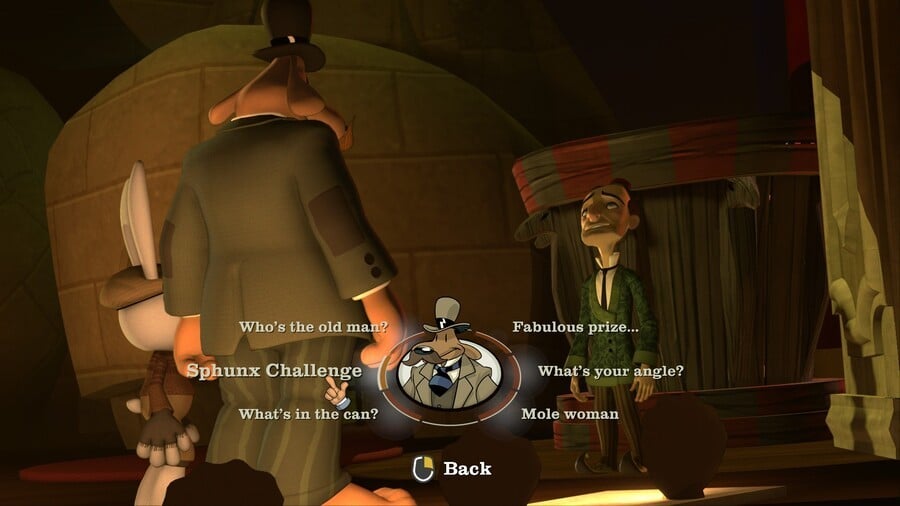
The other thing that made it take a while again was figuring out the art style direction. For season one and season two, it was mostly just going back to the PSDs, up-res them, up-res the textures. We didn't have to repaint a lot of stuff. In season three, we had to repaint a lot of textures just to go for that more cartoony art style. And then, I don't know, the original game was pretty buggy. And so we had a lot of legacy bugs we had to deal with and core fundamental things that Randy had to rewrite the systems for on the coding side. So that took a long time
Connors: I think also, you know, season one and season two are very similar in their approach and they were more compact. And we kind of knew what we needed to do and kind of go room by room. And season three had a lot more kind of one-off immense environments that all required a lot of work to bring up to speed. So they were just bigger and more diverse across all of season three
Sgro: Yeah, and the bigger and more diverse thing led to more performance issues. We have some frame rate issues that we had to deal with, more than we had in season one or season two. So we did go in and try to figure out between lighting and some VFX and other things how to make sure we got our frame rate looking pretty good.
Time Extension: Now that you've finished going back over the trilogy to remaster them, we have to ask — do you have any favourite episodes from across the three seasons?
Connors: There was one thing I wanted to say earlier, and I think it's relevant to this. The 16 episodes that we did, they were all done at different times in the life of the company and what the company was capable of doing.
So the first episode was completely by hook or by crook, whatever it took. It was like eight people trying to realize it versus a much larger team and a more robust company on the second season. So it's like I have an appreciation for the production circumstances from which each episode grew and the different challenges of it.
But to your question, my favorite episode before this was always episode four of season two just because everything was so chaotic up until then and then it tried to pull it together, and the time travel was just a lot of fun. There were different little mechanics to it that were really neat, and there were just so many good moments in it, like The Birthday Song. But I really appreciate season three a lot more now, and the fifth episode of season three is just so, so epic, that I think it's moved into being my favorite.
Time Extension: Do you have any opinions Jon?
Sgro: I think, originally, like back at Telltale working on them and playing them, there's some that I didn't like. With some episodes, I was like, 'Eh, this one's not that great' or whatever. But now that we've remastered them and we've been looking at them again I don't think there's a single episode now where I'm like, 'Eh, that's a shitty episode.' I think they all have good qualities to them and hold up fairly well. So I don't know.
I always like the ones that have really interesting environments and just kind of atmospheric things going on. And I like all the mob stuff in season one, episode three. All of season 3 is great. I don't know what my favourite episode is.
Time Extension: Jumping off what you said Dan, we have a particular soft spot for season 1, even though there's a bit of repetition that probably got you dinged by critics at the time. In retrospect, it's kind of quaint in comparison to the more ambitious later seasons and sort of feels like a TV sitcom, with the same revolving cast and locations, but new scenarios.
Connors: Yeah, it's interesting because you know, we really set out with that sitcom notion. That was a big part of it, and the changes were a response to critics. And that happened a few times throughout the history of the company and there was a balance of things. Because obviously, if we didn't get to kind of the complexity of some of the stuff in season three the Walking Dead portion of the business probably never would have happened. Because we wouldn't have had the toolset that we did.
But originally there was a notion that we would be building a company that made just kind of sitcom-y style things. So it's cool that you recognize that. And the change was after three, because we had to get our bearings, but we couldn't change that fast. So after the episode one feedback, we really started to get that implemented in episode four.

But you know what else is funny? I remember back in the day that season two was always considered kind of the pinnacle of the best work that we did on some level. Like the IGN reviews were all like nines and things and it was like, 'Wow, okay, we're real.' And now when people are judging the Sam & Max games, it's like number five. You know, it's like either season three or Hit the Road, then one, [and so on].
Time Extension: What has the general reaction been to the remasters? Has any one game outperformed the others?
Connors: Well, when season one came back there was a lot of 'Oh my god, Sam and Max are back. I've got to check it out.' And we started to build a community on Discord and people online started talking about it and streamers started playing it. And people that are into it are into it. You know, it's not like millions of people, but it's it's a reasonable audience.
We also introduced new platforms. So the Switch has been big for us. And we've introduced the game to a lot of people there. And that Switch gamer is more consistent with kind of an adventure gamer now. It's an interesting product for them. It's cool for them to check it out, you know. So we've been able to use the new platforms to meet people there.
Switch has been big for us. And we've introduced the game to a lot of people there. And that Switch gamer is more consistent with kind of an adventure gamer now. It's an interesting product for them. It's cool for them to check it out, you know
Season two was a little bit of a drop-off as we kind of expected because it's the second in the season and a lot of people go back and start at one and then work their way through to two. But season three has been really huge because we've opened up all the platforms and we did a launch where it was on PlayStation, Xbox, Switch, and PC, all at once. And kind of that ability to have so many people playing it at once kind of puts it up into the zeitgeist a little bit so people are hearing about it and new people are hearing about it.
Time Extension: With the Sam & Max games done, it would be interesting to hear what's next for the studio — what have the conversations been like internally regarding Skunkape's future? Do you anticipate working on more remasters like this or do you envision yourselves making something else entirely?
Connors: Well, we've developed something that's really powerful, which is the ability to remaster games in the Telltale engine, and there's a lot of stuff there, but they all have tricky situations around them because it's not like four years ago.
Now there's different ownership around a whole bunch of it, so we're trying to develop the right relationships there, because that's super interesting to us, and we're the right people to do it. I think the Sam & Max stuff has shown that. You know, aside from that, that's something we've got to figure out because everybody's too talented to not be working on something cool. So we just gotta figure out what it is.
Time Extension: A big thing that I've seen people say online in terms of Skunkape's future is, 'I hope they do this for Tales of Monkey Island' or 'I hope they do this for another Telltale game'. We definitely think Tales, in particular, is a game that definitely could benefit from this kind of treatment, with new lighting and things like that. It would look amazing. And I guess Disney has kind of shown some interest in doing stuff with Monkey Island again: reuniting with Ron and letting him kind of do his thing with Return to Monkey Island, but then also like doing the Sea of Thieves' crossover as well.
Connors: Yeah like we would love that. That would be amazing.
Time Extension: Yeah, I think it would definitely help introduce those games to a new audience and get the message out, 'Hey, you know these Telltale Monkey Island games are fun to play'. What do you think?
Connors: Yeah, there are things in Tales that I think we might have rushed or concepts that we thought were gonna work, that we got to a certain point, and then kind of failed before we had fully executed them. And even on Sam and Max, there were a couple of those, and when we do this process, we can say, 'Those two or three last things that we wanted to do to make this sing, we can do now.' And I think that's one of the subtle things that makes these remasters so great.
Sgro: Yeah. I love working on these things because back at Telltale — like I worked at every game on Telltale — there were always things that we couldn't have done because of the technology or the budget or time or all of that stuff combined.
You look at the final result and it's like, 'Yeah, it's great, it could be better.' So now it's just been fun taking the Sam & Max games and trying to make them the best that they could possibly be and improve all those things that we didn't have a chance to do originally. So, personally, I'd love to do that to any Telltale product pretty much. But it's limited on what we could do.
Connors: If we had a time machine, we would go back to when we got Sam & Max and try to do more but you know it is what it is.

